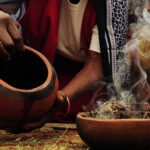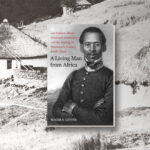In this article, I intentionally focus on Jan Tshatshu (also Tzatzoe) to highlight a profound biblical truth: God reaches out to every tribe and culture to fulfil his divine plan. History tells a very mixed, not to mention deficient, story about this 19th century Xhosa man, who mediated between his own people and colonialist powers in South Africa. Part of his story that’s rarely considered is the role he played in God’s promise to gather people from every tribe, tongue and nation into the new heavens and new earth (Revelation 7:9-10).
God reaches out to every tribe and culture to fulfil his divine plan.
Jan Tshatshu was a witness of the gospel to his own tribe, affirming that God does not leave any tribe or generation without a witness to his name. For as Psalm 22:27 proclaims, “All the ends of the earth shall remember and turn to the Lord, and all the families of the nations shall worship before you.” Similarly, hear Acts 14:17, “he did not leave himself without witness, for he did well by giving you rains from heaven and fruitful seasons, satisfying your hearts with food and gladness.”
In this article, I delve into what I previously mentioned concerning Tshatshu’s role as a mediator between his people, the missionaries, and the settlers.
Missionaries and Misrepresentations of the Gospel
Tshatshu’s experiences reveal the complexities and challenges of this mediation, including the brokenness and hurt caused by some missionaries to Africa. Often, they misrepresented the gospel they preached in how they lived it out. An example of this misrepresentation is the derogatory language adopted by some missionaries, similar to that of the unconverted settlers to describe Tshatshu’s people; those terms include “barbaric,” “savages,” and “Kaffir.”
Some missionaries disliked that Tshatshu was educated and considered their equal. They believed that natives should only be educated to a level inferior to the missionaries. Moreover, some missionaries collaborated with settlers, using new Xhosa converts to gather intelligence about the Chief’s land and layout.
Often, missionaries misrepresented the gospel they preached in how they lived it out.
They viewed the Xhosa practice of using red or yellow clay for adornment and protection as superstitious and insisted that new converts wash it off as a sign of repentance. This was a profound misrepresentation of genuine repentance. For example, the white wedding tradition is not a scriptural teaching but a modern English tradition that became popular after Queen Victoria wore such a wedding gown in 1840. The tradition doesn’t sanctify the ceremony or make it more holy. Rather, through his word, God sanctifies marriage and establishes its constitution. Nonetheless, it is a beautiful cultural tradition that does not go against God’s word, similar to Xhosa tribes who apply red or yellow clay for adornment and protection from the sun and bug bites.
Tshatshu poignantly questioned one missionary, asking why they did not extend grace to his people and instead viewed them as savages incapable of salvation. He asked, “Didn’t you say that Jesus saved you and your people from bad things?” The missionary affirmed this, to which Tshatshu replied, “Then if Jesus saved your people, He can also save my people” (Levine, A Living Man From Africa, p79). This reflects the truth found in Romans 10:12-13. “There is no distinction between Jew and Greek; for the same Lord is Lord of all, bestowing his riches on all who call on him. For ‘everyone who calls on the name of the Lord will be saved.'”
Distinguish Culture From Christian Faith
Due to the shortcomings of some missionaries, many among the Xhosa people to this day don’t distinguish between the gospel of Jesus Christ and white culture, nor between missionaries and colonialists. The gospel is often mocked and its message dented because there was frequently no clear distinction between the Christian missionaries and the unconverted settlers who were driven by greed and plundered the land.
Under the banner of Christ, some missionaries were opportunistic impostors.
This issue is reminiscent of the words in Matthew 7:15-16. “Beware of false prophets, who come to you in sheep’s clothing but inwardly are ravenous wolves. You will recognize them by their fruits. Are grapes gathered from thorn bushes or figs from thistles?” This isn’t to suggest that missionaries were false prophets. But some among them, under the banner of Christ, were opportunistic impostors.
Tshatshu’s Complex Role in Xhosa History
There is also a sense that Tshatshu was used by the missionaries and the diplomacy office as a token of conversion from a savage to Christianity. His trips to London and Scotland were used as a means to solicit support and funding for missionary work and diplomacy progress between London and the Xhosa chiefs. Thus John Philip wrote to Reverend Read: “You know what effect the presence of an intelligent Caffre (Tshatshu) would have on London at this time, strictly to show him as a specimen of irreclaimable savages would do wonders” (Levine, p112).
Philip fleshes this out when he describes Tshatshu’s status, background, and intellect. All of this, according to Philip, made Tshatshu a useful ally. “Tshatshu is not only the son of a Xhosa Chief, but he is considered a branch of the Royal family in Caffre Land, and as great respect is shown to that distinction among the Caffres, you will perceive the advantageous effects his labours are likely to be accompanied with. He is a truly pious and respectable young man, and his attachment to our society has often been tried in rejecting many proposals made to him by our Government and the missionaries of other Societies to induce him to join them. From the date he left Caffreland, he has always longed to return as a missionary to his relations and countrymen” (p77).
Tshatshu’s place in South African history is contentious.
Sadly, this has meant Tshatshu’s place in South African history is contentious. For example, John Brownlee slandered him, despite his role in founding King William’s Town. Furthermore, his missionary work to reach the Xhosa people and the huge contributions he made to language interpretation are usually overlooked. Yet history bears out a different story. “Like Africans wherever Christianity is spreading,” writes another missionary, “Tshatshu has, in fact, been central to the mission’s establishment and success. Tshatshu accommodated the missionaries on land that his father gave them. Putting his own reputation as a Chief’s son at risk, he travelled among neighbours, councillors, and chiefs, introducing the missionaries and their message” (p92).
Despite this, the London Mission Society cut Tshatshu off when he fulfilled his role as a Xhosa Chief and showed concern for his people. One missionary, Buxton, reports to the Directors of the London Mission Society, “That his [Tshatshu’s] attention has been drawn of late to the wickedness of the British governance proceedings as a nation, toward the ignorant and barbarous natives of countries on which we have seized. He laments and writes, ‘What have we Christians done for them? We have usurped their lands, kidnapped, enslaved, and murdered them. The greatest of their crimes is that they sometimes trespass into the lands of their forefathers, and the very greatest of their misfortunes is that they have become acquainted with Christians. Shame on such Christianity'” (p107-108).
A Call for True Christian Witness
Levine’s A Living Man from Africa reveals both the remarkable contributions of Jan Tshatshu and the profound failures of some of the missionaries who engaged the Xhosa people. Tshatshu’s story underscores the need for missionaries who fully submit to Christ’s life, death, and resurrection. True Christian missionaries should embody the gospel’s transformative power, recognising the inherent worth and dignity of every culture while spreading the message of salvation with humility and respect.
Tshatshu’s story underscores the need for missionaries who fully submit to Christ.
“Here there is not Greek and Jew, circumcised and uncircumcised, barbarian, Scythian, slave, free; but Christ is all, and in all” (Colossians 3:11). Only by living out this truth can missionary organisations ensure that their actions align with the gospel they preach, honouring the divine image in every person and making a genuine impact for the kingdom of God.












